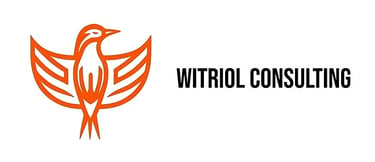How Lean Consulting Strategies Will Shape the Future of Consulting and Partnership Opportunities
The consulting industry, long known for its adaptability and ability to solve complex business challenges, is once again evolving. The rise of lean consulting strategies, inspired by lean manufacturing and lean management principles, is transforming how consultants approach problem-solving, efficiency, and value creation. Lean consulting focuses on delivering maximum value to clients while minimizing waste. As the demand for streamlined operations and more efficient partnerships grows, lean consulting is poised to become a dominant force in the industry. Understanding how people react to these changes, both internally within consulting firms and externally among clients, will be crucial for future success. In this blog, we’ll explore the principles of lean consulting, the ways it will shape the future of consulting, and how it will open up new partnership opportunities. We'll also delve into the importance of understanding human reactions—how emotional intelligence and communication can drive successful lean transformations in both consulting firms and client organizations.
LEAN CONSULTINGMICROSOFTDATA DRIVENEQORGANIZATIONMENTORCOMMAND ECONOMYMANAGEMENT CONSULTINGTRADITIONAL ECONOMYMERGERSMARKET ECONOMYGROWTHPARTNERSHIPSLEADERSHIPACQUISITIONSSTRATEGYTEAMWORKFINANCEMIXED ECONOMYCLIENTSSUCCESSTRAININGCREATING VALUECLIENT RELATIONSHIPSEMOTIONAL INTELLIGENCETECHNOLOGYTIME MANAGEMENT
Shaun Witriol
9/21/20246 min read


How Lean Consulting Strategies Will Shape the Future of Consulting and Partnership Opportunities
The consulting industry, long known for its adaptability and ability to solve complex business challenges, is once again evolving. The rise of lean consulting strategies, inspired by lean manufacturing and lean management principles, is transforming how consultants approach problem-solving, efficiency, and value creation. Lean consulting focuses on delivering maximum value to clients while minimizing waste. As the demand for streamlined operations and more efficient partnerships grows, lean consulting is poised to become a dominant force in the industry. Understanding how people react to these changes, both internally within consulting firms and externally among clients, will be crucial for future success.
In this blog, we’ll explore the principles of lean consulting, the ways it will shape the future of consulting, and how it will open up new partnership opportunities. We'll also delve into the importance of understanding human reactions—how emotional intelligence and communication can drive successful lean transformations in both consulting firms and client organizations.
What is Lean Consulting?
Lean consulting strategies are derived from the lean principles originally developed by Toyota in the mid-20th century, which focus on optimizing processes by eliminating waste and maximizing value. In the consulting world, lean strategies are employed to help businesses operate more efficiently, streamline their operations, and reduce unnecessary costs. The aim is to create more value for clients by focusing on continuous improvement and achieving better results with fewer resources.
In lean consulting, waste can take many forms: excess time spent on non-essential tasks, redundant processes, ineffective communication, or even misalignment between a consultant’s efforts and the client’s actual needs. Lean consultants focus on identifying these inefficiencies and helping clients implement solutions that drive long-term success.
The Core Principles of Lean Consulting
At the heart of lean consulting are five core principles, adapted from lean management practices. These principles are:
Value: Understand what the client perceives as valuable. This principle ensures that the consultant's focus is on delivering outcomes that matter most to the client’s success.
Value Stream: Map out the entire consulting process from start to finish to identify which activities contribute value and which do not. This helps to highlight inefficiencies and areas for improvement.
Flow: Ensure that the consulting process flows smoothly, without bottlenecks or interruptions, ensuring that each step delivers value.
Pull: Rather than pushing solutions or services onto clients, lean consultants allow the client’s needs to "pull" the service through the pipeline. This approach emphasizes responsiveness and alignment with client priorities.
Perfection: Lean consulting is about continuous improvement. Consultants strive for excellence by regularly reviewing performance, identifying new areas for improvement, and adapting to changing client needs.
How Lean Consulting is Transforming the Future of Consulting
1. Client-Centric Value Creation
The consulting industry is shifting towards a client-centric approach where understanding client needs is paramount. Lean consulting allows consultants to work more closely with their clients, ensuring that every action taken is aligned with what the client values most. This means that consultants must truly understand their clients’ pain points, goals, and expectations, and consistently deliver measurable results.
With lean consulting, clients can expect faster results, lower costs, and higher-quality solutions. This shift is likely to increase the level of trust and partnership between consultants and clients, as the lean approach demonstrates a clear focus on client needs and outcomes.
2. Efficiency and Cost-Effectiveness
One of the main benefits of lean consulting is its ability to make consulting more efficient. Traditional consulting methods often involve lengthy processes, extensive research, and significant resource allocation. Lean consulting, on the other hand, focuses on streamlining processes and cutting out unnecessary steps. By doing so, consultants can deliver faster solutions with fewer resources, making the consulting process more cost-effective for clients.
This shift towards efficiency is critical in a business environment where companies are looking to reduce overhead and optimize their operations. Lean consulting helps clients save time and money, which can lead to stronger partnerships and long-term collaboration.
3. Agility and Adaptability
Lean consulting encourages consultants to be more agile and responsive to client needs. In an ever-changing business landscape, this flexibility is invaluable. Consultants who can adapt quickly to new challenges, pivot strategies, and adjust to shifting client priorities will have a significant competitive edge.
In a lean framework, consultants continuously assess and improve their processes, which means they can quickly identify when a strategy isn’t working and make necessary adjustments. This level of agility fosters innovation and creates more opportunities for consultants to offer tailored solutions to their clients.
4. Data-Driven Decision Making
The future of consulting is becoming increasingly data-driven, and lean consulting aligns with this trend. By using data to identify inefficiencies, track progress, and measure outcomes, consultants can provide more objective and actionable insights to their clients. Lean consulting strategies emphasize continuous improvement through data analysis, allowing consultants to refine their approach and deliver better results over time.
This focus on data-driven decision-making also strengthens client relationships. When consultants can back up their recommendations with data, it increases client confidence in the proposed solutions and leads to more successful outcomes.
5. Sustainability and Long-Term Impact
Lean consulting is not just about short-term gains; it’s about creating sustainable, long-term value for clients. Consultants who adopt lean strategies help their clients build more resilient organizations by teaching them how to maintain efficiency and continuously improve. This long-term focus on sustainability makes lean consulting an attractive option for clients looking for lasting solutions rather than quick fixes.
As lean consulting continues to grow, we’ll see more clients seeking out consultants who can help them create sustainable, scalable business models that adapt to future challenges.
How Lean Consulting Will Create New Partnership Opportunities
As lean consulting reshapes the consulting landscape, it will also open up new partnership opportunities. Here’s how:
1. Collaborative Partnerships
Lean consulting fosters a collaborative mindset. Instead of consultants operating as external experts, the lean approach encourages a partnership where consultants and clients work together to identify and solve problems. This collaborative spirit can lead to more robust and long-lasting partnerships, where both parties are invested in each other’s success.
By building strong, trust-based relationships, consultants can position themselves as long-term partners rather than one-time service providers, which can lead to recurring business and deeper engagement with clients.
2. Partnerships Focused on Continuous Improvement
One of the key principles of lean consulting is continuous improvement. This means that partnerships formed under a lean consulting model are not transactional; they are ongoing relationships focused on evolving and improving over time. Consultants and clients will work together to identify new opportunities for improvement, explore innovative solutions, and adapt to changing market conditions.
These partnerships create value over the long term, as both parties continuously seek to optimize processes, reduce inefficiencies, and achieve better outcomes.
3. Cross-Industry Collaboration
Lean consulting strategies are not limited to a specific industry. As more industries adopt lean principles to improve their operations, consultants who specialize in lean strategies will find opportunities to partner with companies across a wide range of sectors. Whether it’s manufacturing, healthcare, technology, or finance, lean consultants can offer valuable expertise to help organizations streamline their operations and drive success.
This cross-industry applicability opens up a vast array of partnership opportunities for consultants willing to adapt their expertise to different business environments.
The Importance of Understanding How People React to Lean Consulting
Implementing lean strategies often requires significant cultural and operational changes within both consulting firms and client organizations. This is where emotional intelligence (EQ) comes into play. Understanding how people react to change is critical for the successful implementation of lean consulting strategies.
1. Managing Resistance to Change
One of the biggest challenges in any transformation effort is resistance to change. Lean consulting often requires clients to re-evaluate long-standing processes and embrace new ways of working. Consultants need to anticipate and manage this resistance by fostering open communication, addressing concerns, and demonstrating the tangible benefits of lean strategies.
Consultants with high emotional intelligence can more effectively navigate these challenges by empathizing with clients’ fears and uncertainties and guiding them through the change process.
2. Building Trust and Engagement
Trust is essential in any consulting relationship, but it’s particularly important when implementing lean strategies that involve significant change. Consultants must build trust by being transparent, listening to client concerns, and showing a commitment to the client’s long-term success.
Engaging with clients on an emotional level—understanding their motivations, challenges, and goals—will help consultants foster stronger relationships and ensure smoother implementation of lean strategies.
3. Empowering Clients
Lean consulting is not about imposing solutions but empowering clients to take ownership of their processes and continuously improve. Consultants who can inspire confidence and encourage clients to take an active role in the lean transformation will be more successful in creating lasting partnerships.
Emotional intelligence plays a key role in empowering clients. By understanding how people react to change and addressing their emotional needs, consultants can foster a sense of ownership and commitment to the lean process.
Conclusion
Lean consulting strategies are transforming the consulting industry, offering a more efficient, client-centric, and data-driven approach to problem-solving. As these strategies gain traction, they will create new partnership opportunities for consultants willing to embrace lean principles and build collaborative, long-term relationships with their clients.
Understanding how people react to lean strategies—whether through managing resistance, building trust, or empowering clients—is crucial for consultants aiming to succeed in this evolving landscape. Emotional intelligence will be key in helping consultants navigate these changes and drive meaningful results for their clients. By mastering lean consulting and focusing on continuous improvement, consultants can position themselves as indispensable partners in their clients’ success.
Lean consulting is not just a trend; it’s the future of consulting, and those who adapt will find themselves at the forefront of a more efficient and impactful industry.
💬 Call to Action: Like and follow Witriol Consulting on LinkedIn, Instagram, Facebook, and YouTube for more insights and strategies on effective leadership and time management.
Current Certifications
Small Local Business Enterprise (SLBE) - (San Diego)
Local Small Business Enterprise - (LSBE) - (Los Angeles)
Minority Owned Business (MBE) - (San Diego and Los Angeles, Federal)
Small Business (Micro) - (California)
Disadvantaged Business Enterprise - (California, Arizona, Oregon, Hawaii)
Small Disadvantaged Business - (Federal)
Asian Pacific Business Enterprise - (Federal)
Pending Certifications
8a - (Federal)
© 2024. All rights reserved.


certifications
consultations
